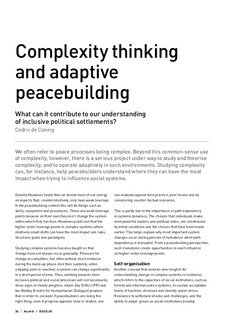| dc.contributor.author | De Coning, Cedric | |
| dc.date.accessioned | 2019-05-21T12:09:23Z | |
| dc.date.available | 2019-05-21T12:09:23Z | |
| dc.date.created | 2019-03-01T13:02:38Z | |
| dc.date.issued | 2019 | |
| dc.identifier.citation | Accord. 2019, 28 36-38. | |
| dc.identifier.issn | 1365-0742 | |
| dc.identifier.uri | http://hdl.handle.net/11250/2598299 | |
| dc.description.abstract | We often refer to peace processes being complex. Beyond this common-sense use of complexity, however, there is a serious project under way to study and theorise complexity, and to operate adaptively in such environments. Studying complexity can, for instance, help peacebuilders understand where they can have the most impact when trying to influence social systems. Adaptive peacebuilding approaches can contribute in original and innovative ways to more inclusive peace processes and more self-sustainable political settlements. Incorporating complexity thinking will help mediators and other peace practitioners to become more confident in coping with uncertainties and more comfortable experimenting with adaptive approaches. | |
| dc.description.abstract | Complexity thinking and adaptive peacebuilding | |
| dc.language.iso | eng | |
| dc.relation.uri | https://www.c-r.org/accord/inclusion-peace-processes/complexity-thinking-and-adaptive-peacebuilding | |
| dc.title | Complexity thinking and adaptive peacebuilding | |
| dc.type | Journal article | |
| dc.description.version | publishedVersion | |
| dc.source.pagenumber | 36-38 | |
| dc.source.volume | 28 | |
| dc.source.journal | Accord | |
| dc.identifier.cristin | 1681709 | |
| cristin.unitcode | 7471,13,0,0 | |
| cristin.unitname | Fred, konflikt og utvikling | |
| cristin.ispublished | true | |
| cristin.fulltext | original | |
